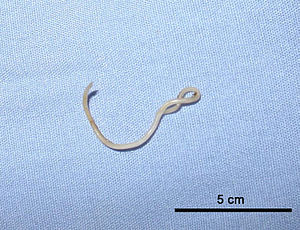
It also provides the opportunity to fight similar parasitic infections
An international research collaboration has mapped the entire genome of the roundworm, a parasitic intestinal worm that currently infects some 1.2 billion people worldwide, researchers at Copenhagen University said here Thursday.
The breakthrough could help pave the way towards finding vaccines or medicines to treat or prevent the parasite that infects millions of people every year with roundworm, the university said.
The project was conducted by Australia’s Melbourne University, China’s Beijing Genomics Institute at Shenzhen (BGI-Shenzhen) and Denmark’s Copenhagen University, among others. The research findings were published Thursday in the science journal Nature.
As roundworm in pigs closely resembles roundworm in humans, the researchers experimented on pigs to map the roundworm genome, said Peter Nejsum, a post-doctoral fellow at Copenhagen University’s Life Sciences Faculty, who worked on the project.
He told Xinhua that there are “different genes used by the parasite to migrate around the host’s body,” as it moves from the intestine to other internal organs like the lungs and liver, before migrating back to the intestines.
“The researchers have also looked into the genes expressed in the parasite in the different stages of this cycle,” as it wanders around its host, be it pig or human, Nejsum said.
This was done by using a new sequencing method that makes it possible to read DNA, the genetic code, in a fast and effective way, the researchers said.
Most of the gene sequencing was conducted by researchers in China, while the genome assembly was performed in Australia.
Moreover, the research identified 750 molecules which are necessary for breaking down a host animal’s tissue, and which the parasite uses to hide itself from the host’s immune system.
“The new knowledge can be used to identify molecules that are unique to the parasite, and develop medicine that is targeted to attack only these parasite molecules, while not affecting the rest of the (host) body,” Nejsum said in a press statement announcing the research.
“It also provides the opportunity to fight similar parasitic infections that afflict a quarter of the world’s population,” he added.
Read more . . .
Bookmark this page for “gene sequencing” and check back regularly as these articles update on a very frequent basis. The view is set to “news”. Try clicking on “video” and “2” for more articles.








